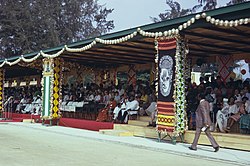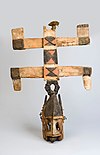IntroductionWelcome to the Pan-Africanism portal!
Bienvenue sur le portail panafricanisme!   Pan-Africanism is a worldwide movement that aims to encourage and strengthen bonds of solidarity between all indigenous peoples and diasporas of African ancestry. Based on a common goal dating back to the Atlantic slave trade, the movement extends beyond continental Africans with a substantial support base among the African diaspora in the Americas and Europe. Pan-Africanism can be said to have its origins in the struggles of the African people against enslavement and colonization and this struggle may be traced back to the first resistance on slave ships—rebellions and suicides—through the constant plantation and colonial uprisings and the "Back to Africa" movements of the 19th century. Based on the belief that unity is vital to economic, social, and political progress, it aims to "unify and uplift" people of African ancestry. (Full article...) Selected articleThe Black Panther Party (BPP), originally the Black Panther Party for Self-Defense, was a political organization founded by Bobby Seale and Huey Newton in October 1966. The party was active in the United States from 1966 until 1982, with international chapters operating in the United Kingdom in the early 1970s, and in Algeria from 1969 until 1972. At its inception on October 15, 1966, the Black Panther Party's core practice was its armed citizens' patrols to monitor the behavior of officers of the Oakland Police Department and challenge police brutality in Oakland, California. In 1969, community social programs became a core activity of party members. The Black Panther Party instituted a variety of community social programs, most extensively the Free Breakfast for Children Programs, and community health clinics to address issues like food injustice. The party enrolled the most members and made the greatest impact in the Oakland-San Francisco Bay Area, New York, Chicago, Los Angeles, Seattle, and Philadelphia. Selected biography
Alieu Ebrima Cham Joof (22 October 1924 – 2 April 2011) commonly known as Cham Joof, (pen name: Alh. A.E. Cham Joof) was a Gambian historian, politician, author, trade unionist, broadcaster, radio programme director, scout master, Pan-Africanist, lecturer, columnist, activist and an African nationalist who advocated for the Gambia's independence during the colonial era. Cham Joof was born on 22 October 1924 at 7 Griffith Street (Half-Die) in Bathurst now Banjul, the capital of the Gambia. He came from a Serer and Wolof background. He was the third child and the eldest son of Ebrima Joof (1887–1949) and Aji Anna Samba (1896 – 9 April 1977). On his father's side (the Joof family), he was a descendant of the Joof Dynasty of Sine and Saloum, and the Njie Dynasty of Jolof. On his mother's side, he was the great grand-nephew of Tafsir Sa Lolly Jabou Samba — a 19th-century Senegambian jihadist, military strategists and advisor to Maba Diakhou Bâ and one of the commanders of his army. Cham Joof was the elder brother of Gambian barrister Alhaji Bai Modi Joof. Selected historyJim Crow laws were state and local laws that enforced racial segregation in the Southern United States. All were enacted in the late 19th and early 20th centuries by white Democratic-dominated state legislatures after the Reconstruction period, the laws were enforced until 1965. In practice, Jim Crow laws mandated racial segregation in all public facilities in the states of the former Confederate States of America, starting in the 1870s and 1880s, and were upheld in 1896, by the U.S. Supreme Court's "separate but equal" legal doctrine for facilities for African Americans, established with the court's decision in the case of Plessy vs. Ferguson. Moreover, public education had essentially been segregated since its establishment in most of the South, after the Civil War (1861–65). Selected culture
The traditional African religions (or traditional beliefs and practices of African people) are a set of highly diverse beliefs that include various ethnic religions. Generally, these traditions are oral rather than scriptural, include belief in a supreme creator, belief in spirits, veneration of the dead, use of magic and traditional medicine. Adherents of traditional religions in Sub-Saharan Africa are distributed among 43 countries and are estimated to number over 100 million. Although the majority of Africans are adherents of Christianity or Islam, African people often combine the practice of their traditional belief with the practice of Abrahamic religions. The two Abrahamic religions are widespread across Africa, though mostly concentrated in different areas. They have replaced indigenous African religions, but are often adapted to African cultural contexts and belief systems. West and Central African religious practices generally manifest themselves in communal ceremonies or divinatory rites in which members of the community, overcome by force (or ashe, nyama, etc.), are excited to the point of going into meditative trance in response to rhythmic or driving drumming or singing. One religious ceremony practiced in Gabon and Cameroon is the Okuyi, practiced by several Bantu ethnic groups. In this state, depending upon the region, drumming or instrumental rhythms played by respected musicians (each of which is unique to a given deity or ancestor), participants embody a deity or ancestor, energy or state of mind by performing distinct ritual movements or dances which further enhance their elevated consciousness. When this trance-like state is witnessed and understood, adherents are privy to a way of contemplating the pure or symbolic embodiment of a particular mindset or frame of reference. This builds skills at separating the feelings elicited by this mindset from their situational manifestations in daily life. Such separation and subsequent contemplation of the nature and sources of pure energy or feelings serves to help participants manage and accept them when they arise in mundane contexts. This facilitates better control and transformation of these energies into positive, culturally appropriate behavior, thought, and speech. Also, this practice can also give rise to those in these trances uttering words which, when interpreted by a culturally educated initiate or diviner, can provide insight into appropriate directions which the community (or individual) might take in accomplishing its goal. Selected imagesOrganisationsAll-African People's Revolutionary Party · African Society for Cultural Relations with Independent Africa · African Unification Front · African Union · African Queens and Women Cultural Leaders Network · Conseil de l'Entente · Convention People's Party · East African Community · Economic Freedom Fighters · Global Afrikan Congress · International African Service Bureau · International League for Darker People · Organisation of African Unity · Pan African Association · Pan-African Congress · Pan Africanist Congress of Azania · Rassemblement Démocratique Africain · Pan Africa Chemistry Network · Pan African Federation of Accountants · Pan-African Freedom Movement for East and Central Africa · Sahara and Sahel Observatory · UNIA-ACL · ZANU–PF
See also
& Festivals Photo by Helinä Rautavaara (1977) Publications
Films and TVAudios and videosDid you know ...that on arriving in Cuba in 1920, the SS Yarmouth (crew pictured), flagship of Marcus Garvey's Black Star Line, was hailed as the "Ark of the Covenant of the colored people"?
Selected quotesIn his "Whirlwind Message", the First Message to the Negroes of the World from Atlanta Prison (10 February 1925), Marcus Garvey delivered the following message:
Pan-Africanism topicsCategoriesThings you can do
Related portalsAssociated WikimediaThe following Wikimedia Foundation sister projects provide more on this subject:
Discover Wikipedia using portals | |||||||||||||||||||||||||||||||||||||||






























